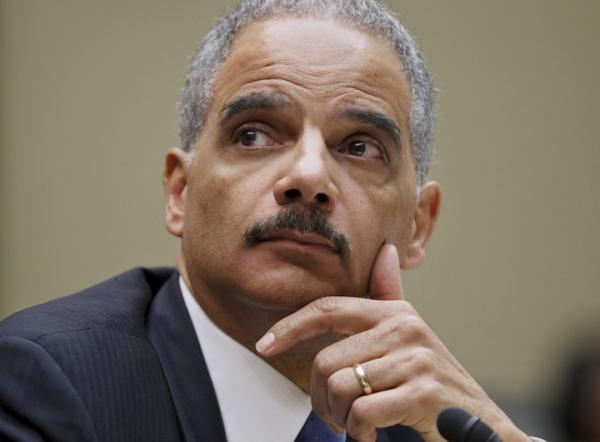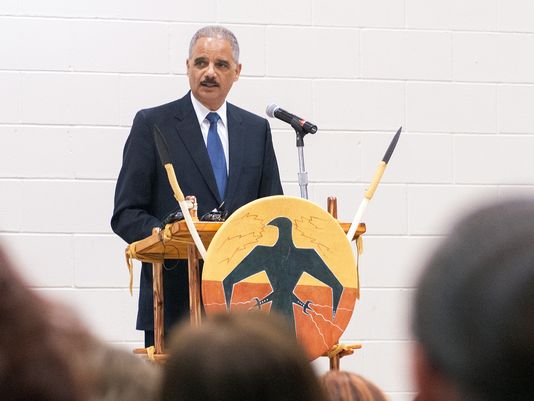Washington, DC – The Department of Justice released today its second report to Congress entitled Indian Country Investigations and Prosecutions, which provides a range of enforcement statistics required under the Tribal Law and Order Act of 2010, as well as information about the progress of the Attorney General’s initiatives to reduce violent crime and strengthen tribal justice systems.
The report, based on data compiled from the case management system used by U.S. Attorney’s Offices (USAO), shows prosecutors in 2013 continued to bring substantial numbers of cases to federal court (a 34 percent increase over FY 2009 numbers) and prosecute a substantial majority of all cases referred to them. Of the cases that were declined for federal prosecution, most were declined for insufficient evidence or because they were referred to another prosecuting authority, such as the tribe, for potential prosecution.
“As detailed in this report, the Department of Justice is making good on our commitment to strengthen cooperation with sovereign tribes, reduce violent crime, and ensure justice for every individual,” said Attorney General Eric Holder. “From our work to empower Indian women under the landmark Violence Against Women Reauthorization Act, to the task force we established to safeguard children in Indian country from violence and abuse, we have made significant strides – in close partnership with tribal nations – to bolster the safety and security of all American Indian and Alaska Native communities. As we move forward, we will continue to expand on this critical work; to deepen our ongoing efforts; and to reaffirm our dedication to the promise of equal rights, equal protection, and equal justice for all.”
Although declination rates are an imperfect means of evaluating the effectiveness of criminal justice in Indian country or elsewhere, the report shows that with few exceptions, areas where the largest populations of American Indian people live and suffer from the most serious crime rates, such as the Southwest and the northern plains states (which together handled approximately 70 percent of the 2,542 cases resolved in 2013), federal declination rates were the lowest in the nation. For instance, South Dakota had the second to highest number of cases resolved in the country last year, 470 cases, and one of the lowest declination rates of 26 percent. Arizona resolved the highest number of cases, 733 cases, and had a declination rate of 28 percent.
Associate Attorney General Tony West announced the findings in remarks to the Four Corners Indian Country Conference today on the Navajo Nation in Flagstaff, and met separately with the Attorney General’s advisory subcommittee on Native American issues to discuss the report, among other matters.
“We are witnessing an unprecedented era of collaboration among U.S. Attorneys’ offices and tribal law enforcement and prosecutors across the country,” said Associate Attorney General West. “This report shows the fruits of this continuing partnership between the federal government and American Indian tribes, including enhancing training and capacity building for tribal court systems and improving responses to victims in Indian country.”
“Over the past five years, the Justice Department and our tribal partners have taken important steps forward on our journey toward a safer Indian Country,” said Timothy Purdon, U.S. Attorney for the District of North Dakota and chair of the Attorney General’s advisory subcommittee on Native American issues. “Vigorous enforcement of federal laws is vitally important to strengthening public safety on American Indian reservations. We are pleased to see in this report that U.S. Attorney’s Offices across the country continue to work hard to remove the most dangerous offenders and work closely with tribal law enforcement and prosecutors. These promising numbers are the direct result of this enhanced communication and collaboration.”
“The FBI continues to be committed to public safety in Indian Country,” said FBI Assistant Director Joseph S. Campbell. “Our partnership with federal, state, local, and tribal agencies remains strong as we continue to aggressively address violent crime and victimization in tribal communities.”
The information contained in the report shows the following:
- The Justice Department’s prioritization of Indian country crime has continued to result in substantial numbers of prosecutions, despite resource constraints that impacted the U.S. Attorney community in 2013. Between FY 2009 and FY 2012, the number of cases the department filed against defendants in Indian country increased nearly 54 percent. In FY 2013, due to fiscal challenges, overall case filings in Indian country declined somewhat compared to FY 2012, but still remained 34 percent above the number of cases filed when the department first began its department-wide tribal justice initiative in 2009. Notwithstanding the fiscal impact of the sequester, reduced budgets, and a hiring freeze, federal agents and prosecutors continued to focus their efforts on improving public safety in Indian country.
- A substantial majority of Indian country criminal investigations opened by the FBI were referred for prosecution.
- A substantial majority of Indian country criminal cases opened by the United States Attorneys’ Offices were prosecuted.
- USAO data for CY 2013 show that 34 percent (853) of all Indian country submissions for prosecution (2,542) were declined for prosecution. In CY 2012, USAOs declined approximately 31 percent (965) of all (3145) Indian country submissions for prosecution. USAO data for CY 2011 indicate that just under 37 percent (1,041) of all Indian country submissions for prosecution (2,840) were declined.
- The most common reason for declination by USAOs was insufficient evidence (56 percent in CY 2013, 52 percent in CY 2012, and 61 percent in CY 2011).
- The next most common reason for declination by USAOs was referral to another prosecuting authority (21 percent in CY 2013, 24 percent in CY 2012, and 19 percent in CY 2011).
The most common reason FBI Indian country investigations were closed administratively without referral for prosecution was that the investigation concluded that no federal crime had occurred.
- For instance, all but 30 of the 164 death investigations the FBI closed administratively in CY 2013 were closed because the FBI established that the death was due to causes other than homicide – i.e., accidents, suicide, or death from natural causes.
Other important developments in FY 2013:
VAWA Pilot Projects
The fight against domestic violence in Indian country has been an especially important priority for the Department of Justice, and in 2013, Congress and this administration took an historic step forward with the passage of the Violence Against Women Reauthorization Act of 2013 (VAWA 2013), which the President signed into law on March 7, 2013.
Congress, in VAWA 2013, provided new tools to fight domestic violence in Indian country, and the department spared no time utilizing them. From the date the act took effect, March 7, 2013, through the end of fiscal year 2013, U.S. Attorneys with prosecutorial responsibilities in Indian country have charged defendants with the amended provisions of the federal assault statutes that strengthened penalties for domestic assault offenses, such as strangulation and stalking. And, while the new law’s tribal criminal jurisdiction provision takes effect generally on March 7, 2015, under VAWA 2013’s “Pilot Project” provisions, the department recently approved three tribes’ applications voluntary “Pilot Project” to begin exercising special domestic violence criminal jurisdiction sooner. These tribes – the Pascua Yaqui Tribe of Arizona, the Umatilla Tribes of Oregon, and the Tulalip Tribes of Washington – will be the first tribes in the nation to exercise special criminal jurisdiction over crimes of domestic and dating violence, regardless of the defendant’s Indian or non-Indian status, under VAWA 2013.
Strengthening Partnerships and Support for Tribal Self-Governance
Strengthening partnerships and tribal self-governance was a major theme of the Attorney General’s message to tribal leaders on Nov.13, 2013, at the White House Tribal Nations Conference, where he announced a proposed statement of principles to guide the department’s work with federally recognized tribes. As the Attorney General said, “ As a result of these partnerships – and the efforts of everyone here – our nation is poised to open a new era in our government-to-government relationships with sovereign tribes.”
U.S. Attorneys’ offices around the country are engaged in an unprecedented level of collaboration with tribal law enforcement, consulting regularly with them on crime-fighting strategies in each district. One important example of this is the department’s enhanced Tribal Special Assistant U.S. Attorney (SAUSA) program. Tribal SAUSAs are cross-deputized tribal prosecutors who are able to prosecute crimes in both tribal court and federal court as appropriate. These Tribal SAUSAs serve to strengthen a tribal government’s ability to fight crime and to increase the USAO’s coordination with tribal law enforcement personnel. The work of Tribal SAUSAs can also help to accelerate a tribal criminal justice system’s implementation of TLOA and VAWA 2013.
Read the entire report at www.justice.gov/tribal/tloa.html
Read about the Justice Department’s efforts to increase public safety in Indian County at www.justice.gov/tribal/accomplishments.html




